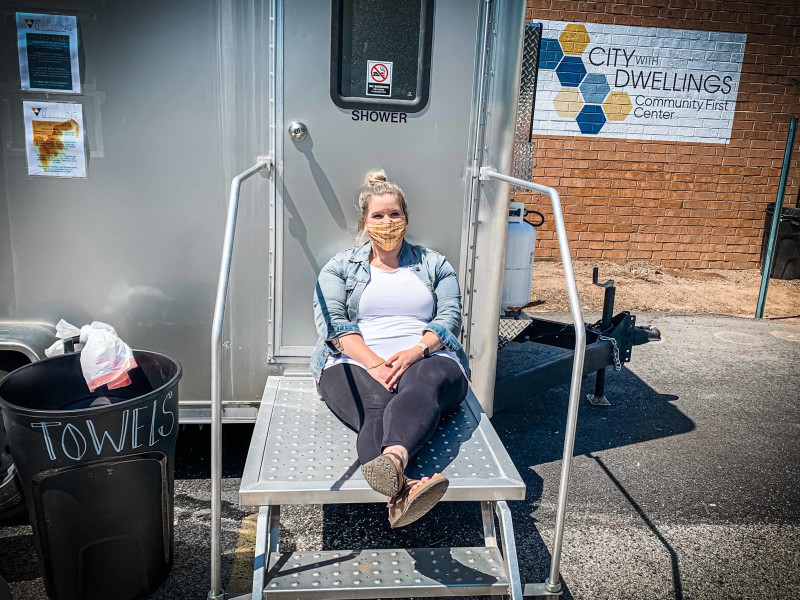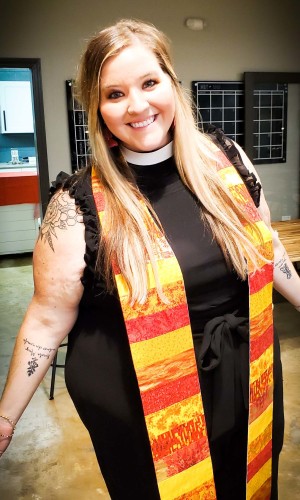New Dwellings: Alumna’s ministry serves homeless in pandemic
August 13, 2020

BY EMILY CHRISTENSEN | SUBMITTED PHOTOS
When the Holy Spirit moves, the Rev. Emily Harkins Norris ’08 has learned to go with it, even if the timing doesn’t make sense. After seven years of volunteering and working with an overflow shelter ministry in Winston-Salem, N.C., Norris brought the idea for a new church, specifically serving the area’s homeless population, to leaders of the Evangelical Lutheran Church in America (ELCA) and her synod.
“In a typical way of developing a church, you spend at least two years doing the discerning and the planting and the relationship building before you even launch it,” said Norris, who had volunteered with those experiencing homelessness since 2013 through City with Dwellings Emergency Overflow Shelter at Augsburg Lutheran Church, where she worked as a youth pastor. “They’re just looking for a way to land and a pastor to help lead it — it’s already there. So it was a really easy ‘Yes’ for the church.”
After getting paperwork ready through the fall of 2019 and a name — The Dwelling — the new ministry planned an opening date: Feb. 1, 2020. “Just in time for COVID to change the game,” said Norris, the new church’s mission developer.
But instead of closing its doors due to an unprecedented pandemic, the ministry adapted to provide holistic care to an at-risk community even faster. The Dwelling planned to offer a mobile shower unit as part of its ministry, but it wouldn’t be ready for weeks. Instead, they rented a shower unit that could go immediately into action, helping people get clean three or four days a week. In addition to showers, The Dwelling gives out socks, underwear, clean T-shirts, and toiletries. “In this really crazy turn of events, I prayed so hard and so deeply that this church would be relevant from the beginning. And there is nothing that could have prepared me for how that relevancy would actually look,” said Norris.
Fifty to 60 people a week were showering at the mobile unit in early summer, and The Dwelling shares a building with a partner organization to provide access to computers, phones, and mail delivery for those without a home.

“It’s this holistic wrap-around care that the organization is able to provide some of the social service side of things,” said Norris. “And then the church comes alongside and rounds it out with the real personal care and spiritualness; it’s this very holistic way for how we’re caring for this community.”
While the pandemic has kept churches across the country from gathering in person, The Dwelling has found that togetherness is a matter of survival for the people it serves. “We are not a typical, normal congregation,” said Norris. “My community of people, the coronavirus did not impact them in the ways that it did others. And it still is not, because when you don’t have shelter, when you don’t have food, when you don’t know where you’re going to shower next, when you don’t have human things that are just a guarantee for you, a virus that could take you out is the least of your worries.”
She had a profound moment of understanding how the pandemic is affecting the homeless population while talking to a man named John at The Dwelling. “I said, ‘John, you have to social distance!’ And he looked at me and he goes, ‘Miss Emily, if we distance, we die,’” recalled Norris.
“Community looks so different within populations that are experiencing homelessness; they actually physically depend on that closeness to survive. And so it’s really hard to tell this population, ‘You have to separate to protect yourself’ when that’s so counterintuitive to the way that they actually have to survive in this world.”
Sunday morning worship begins with fellowship and a light meal to feed people physically as well as spiritually. When waiting in the parking lot for showers during the week, the community becomes worshipful with musicians singing and playing instruments. Squares painted on the pavement help everyone stay socially distanced, and staff are disinfecting often, but the loss of physical contact has been hard for Norris as she ministers. “When I’m talking with someone, I want to be able to touch their hand or touch their shoulder. And you can’t do that,” she said. “The physical-ness of being in relationship, there’s some loss in that. But everyone understands.”
Starting a new church at the onset of a pandemic is not the first time Norris has felt the spirit’s urging down an uncertain path. When serving as a youth pastor at Redeemer Lutheran in Waverly, she received a call to youth ministry in North Carolina in 2013, and she resisted going to interview. Then her bishop in the Northeast Iowa Synod, the Rev. Steven Ullestad ’75, told her, “Emily, whales are really messy. Stop being a Jonah.” So she flew to North Carolina for an interview, and within a month she was on a new path that would eventually lead to earning her Master of Divinity at Wartburg Seminary, ordination this past May into the ELCA, and helping lead the new ministry at The Dwelling.
For Norris, ministry was not part of her plans in her early days at Wartburg. The history and history education double major was far from her Colorado home and hadn’t been involved in campus ministry. She didn’t attend a Eucharist service until she felt a nudge to go one winter night when summer camps were recruiting for staff. By the end of the night, she had been hired to work at a camp for the summer, another unplanned move that brought her closer to a life of ministry.
Her second May Term trip to Africa during her senior year changed the trajectory of her path, Norris said. She met the Rev. Herb Hafermann ’59 during her religion course in Tanzania, where he was a volunteer after retiring from many years of ministry in Africa.
“He was the first pastor that really showed me that pastors don’t have to be typical and that the call to the church is bigger than just congregational ministry,” she said. “I started listening a little bit closer to what that could be in my life.” Hafermann became a lifelong friend, meeting with some of Norris’ later group trips to Africa and presiding at her wedding. She attended his funeral in 2017, and the bishop who ordained Norris this past May wore a stole belonging to Hafermann.
Her relationships with Wartburg’s history faculty also have been meaningful, both during her time as a student and long afterward. “All of them at different points would talk about faith and religion and would share parts and pieces of their faith as well. I think that’s across the board for all of the professors at Wartburg,” said Norris. “We know that our learning is a part of not just the education process, but it’s the formation of who we are as people, and bringing in that faith in people’s own histories and experiences and understandings, it rounded us all out.
“Dr. (Daniel) Walther and Dr. (Erica) Lindgren and Dr. (Terrence) Lindell, all of them, 10 years later, are some of the first people to comment and congratulate and say, ‘We’ve always known you’ve been made for this.’ They are still actively connecting and cheering me on. And Kathy Book, one of my education professors, always is engaging still,” said Norris. “My friends that I made at Wartburg have been some of my greatest cheerleaders on this journey.”
